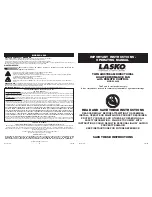
page 3 of 5
- Exposure to radiation that can damage product components, e.g.
strong UV rays or thermal radiation.
- Operating during external vibration.
- Operating the product close to inflammable materials or
components.
- Operating the product in an explosive atmosphere
- Use of the prouct as a safety component or for performing safety-
relevant functions.
- Operating in medical devices with life-sustaining or life-saving
function.
- Operating in non-stationary systems, e.g. railway vehicles, aircraft
and spacecraft.
- Operating with fully or partially dismantled or manipulated protective
equipment.
- Operating the product under conditions other than those mentioned
in the technical data.
- Furthermore, all fields of application not mentioned under intended
use.
An in situ assessment must be conducted of the heating behavior
(appropriate and inappropriate operation), the protection against
contact, electrical shocks, impact of foreign objects or water and the
usage at altitudes higher than 2000 meters.
Contact ebm-papst if you have specific queries regarding the product.
3
TECHNICAL DATA
Drawing, see annex
Technical description
Airflow direction
Air outlet over struts
Rotational direction
looking at rotor
counterclockwise
Nominal voltage
24,0 V
Current consumption
980 mA
Power consumption
23,5 W
Speed
4.000 1/min
Max. free-air flow
460,0 m3/h
Weight
0,760 kg
Protection class
III
Max. torque when
mounted across both
mounting flanges
wire outlet corner: 260 Ncm
remaining corners: 260 Ncm
Screw size
ISO 4762 - M4 degreased,
without an additional brace and
without washer
The product is intended for use in sheltered rooms with controlled
temperature and controlled humidity. Directly exposure to water must
be avoided.
Pollution degree 1 (according DIN EN 60664-1)
There is either no pollution or it occurs only dry, non-conductive
pollution. The pollution has no negative impact.
Ambient conditions
Permitted ambient temperature
Transport and storage
Operation
-40 °C ... 80 °C
-20 °C ... 55 °C
Vibration and shock load
At stationary operation:
sinus vibration
1,0 g; 5 - 500 Hz; 3 x 1 sweep
(Resonance search run)
Noise
0,5 m2/s3, 10 - 50 Hz; +12
dB/oct f. 5 - 10 Hz; -12 dB/oct f.
50 - 100 Hz; 3 x 30 min
Repetitive shock
Half sine; 5 g, 11 ms; 6 x 100
shocks
Transport and storage:
Noise
2,0 m2/s3, 5 - 20 Hz; -3 dB/oct f.
20 - 500 Hz; 3 x 30 min
Thrusts
Half sine; 18 g, 6 ms; 6 x 100
shocks
Do not operate your product in the resonance range.
4
CONNECTION AND COMMISSIONING
Connect mechanical parts
CAUTION
Risk of cutting/squashing when
removing the product from the
packaging and during mounting.
Grasp the housing and lift the product
carefully out of the packaging. Avoid
impact.
Wear safety boots and cut-resistant
gloves.
NOTE
Risk of damage to electronic
components.
Use ESD protective equipment when
mounting.
Connect electrical parts
Connect to the mains after installation.
DANGER
Compliance with the electrical
installation regulations
Observe the connection regulations
that are valid in your country. (e.g.
fusing, GFCI)
CAUTION
Electrical voltage
The product is a built-in
component and has no switch for
disconnecting power.
Only connect the product to
current circuits that can be
switched off by a switch (all poles
disconnected). When working on
the product, secure the
system/machine in which the
product is installed against
switching on again.
NOTE
Electromagnetic compatibility (EMC) may affect the system integration
of the product due to interaction.
Ensure the electromagnetic compatibility of the entire system.
Содержание 6424 H
Страница 5: ...page 5 of 5...























